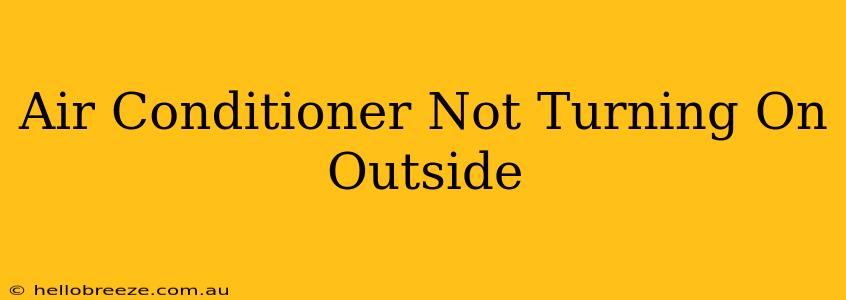Is your air conditioner refusing to turn on? A non-functional outdoor unit can leave you sweating in the summer heat. Don't panic! This guide will help you troubleshoot the problem and get your AC back up and running. We'll cover common causes and offer solutions to help you identify and fix the issue, saving you time and potentially costly repair bills.
Common Reasons Your Outdoor AC Unit Won't Turn On
Several factors can prevent your outdoor AC unit from starting. Let's explore some of the most frequent culprits:
1. Power Supply Issues:
-
Tripped Breaker or Blown Fuse: This is the most common and easiest fix. Check your home's electrical panel for a tripped breaker (it will be in the "off" position) or a blown fuse (it will appear broken or darkened). Simply reset the breaker or replace the fuse. If the breaker trips again immediately after resetting, there's a more serious electrical problem that requires a qualified electrician.
-
Disconnected Power Cord: Ensure the power cord connecting to the outdoor unit is securely plugged into both the unit and the power source. Sometimes, animals or weather can dislodge the cord.
2. Frozen Condenser Coils:
- Ice Buildup: A frozen condenser coil prevents the unit from running. This often indicates a refrigerant leak, a clogged air filter (restricting airflow), or a malfunctioning fan motor. Do not attempt to defrost the coils yourself with hot water; this can damage the unit. Call a qualified HVAC technician for assistance.
3. Capacitor Problems:
- Failed Capacitor: The capacitor is an essential component responsible for starting the compressor. A faulty capacitor prevents the compressor from engaging. Replacing a capacitor requires some electrical knowledge and should be done by a professional unless you're experienced with electrical work.
4. Compressor Issues:
- Compressor Failure: The compressor is the heart of your AC system. A faulty compressor is a serious problem and usually requires professional repair or replacement. Symptoms of a bad compressor include unusual noises, overheating, and the unit simply not turning on.
5. Fan Motor Problems:
- Faulty Fan Motor: The outdoor unit's fan motor circulates air over the condenser coils. If the fan motor is malfunctioning, it can cause the unit to overheat and shut down. You'll often hear unusual noises or notice that the fan isn't spinning.
6. Refrigerant Leaks:
- Low Refrigerant Levels: A significant refrigerant leak will prevent your AC from functioning correctly, often leading to freezing coils and an inability to start. Refrigerant handling requires specialized tools and training. Contact an HVAC technician for refrigerant leak detection and repair.
7. Thermostat Malfunctions:
- Incorrect Thermostat Settings: While the problem seems to be outside, double-check your thermostat. Ensure it's set to "cool," and the temperature is set lower than the ambient room temperature. Try replacing the batteries in the thermostat as well.
When to Call an HVAC Technician
While some issues can be addressed with basic troubleshooting, several problems require the expertise of a qualified HVAC technician:
- Electrical problems: Anything beyond resetting a breaker or replacing a fuse.
- Refrigerant leaks: Never attempt to handle refrigerant yourself.
- Compressor or fan motor failure: These are significant repairs.
- Frozen condenser coils: Defrosting incorrectly can cause further damage.
- Persistent problems: If you've tried basic troubleshooting and the problem persists, it's time to call a professional.
Ignoring a malfunctioning AC unit can lead to further damage and increased repair costs. Addressing the issue promptly ensures your comfort and the longevity of your system. Remember, safety is paramount; don't attempt repairs beyond your skill level. Contacting a qualified technician is always the best course of action when dealing with complex electrical or refrigerant systems.

